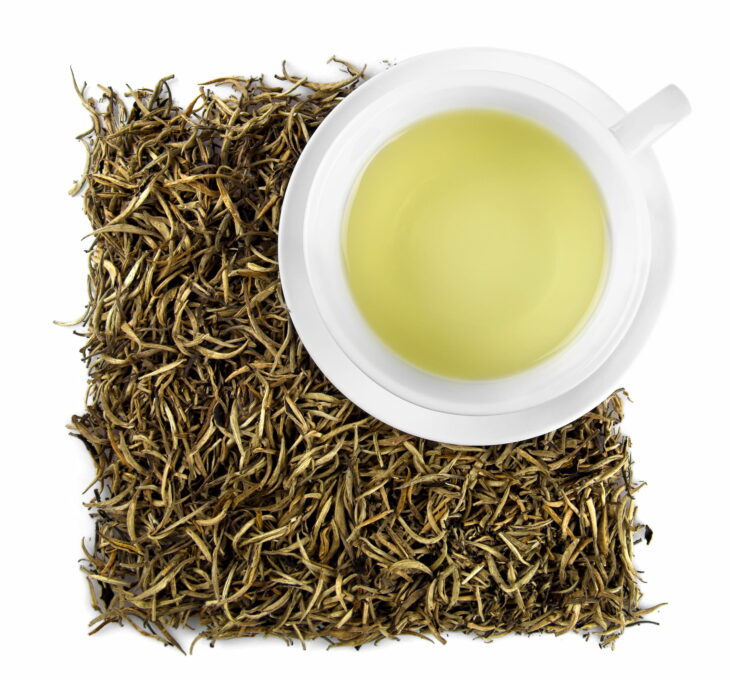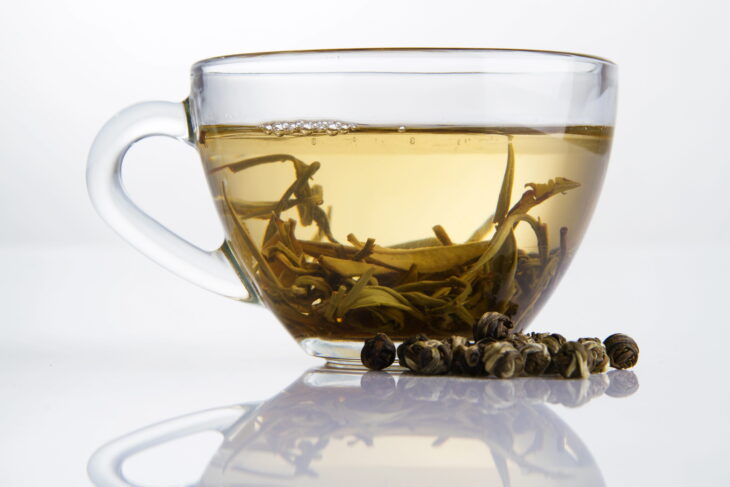Disclosure: Articles may contain affiliate links. As an Amazon Associate, we earn from qualifying purchases (at no additional cost to you). See our full disclosure here.
Hey there, tea enthusiasts! If you’re anything like me, you probably look forward to a nice, hot cup of tea to start your day or wind down in the evening.
Some of us enjoy the lighter, more delicate flavor of white tea, but you might be wondering: Does white tea have caffeine? It’s an important question. Many of us want that little caffeine boost in the morning, but on the other hand, too much caffeine late in the day or in the evening can cause sleep problems.
And, as we’re about to learn, white tea has some amazing health benefits, but if you’re trying to cut back on caffeine, things can get tricky. Let’s get into it!

What is White Tea?
Before we jump into the nitty-gritty of caffeine content, let’s talk about what white tea actually is. Black, green, white, yellow, puerh, and oolong teas all come from the same plant: Camellia sinensis.
The difference in flavor and the type of tea comes down to how the leaves are processed after being picked. White tea is one of the least processed types of tea, made from the young leaves and buds of the Camellia sinensis plant. Its name comes from the fine white “hairs” on the unopened buds of the plant.
With its subtle flavor and delicate aroma, white tea has gained popularity among tea enthusiasts looking for a milder alternative to green or black tea.

Does White Tea Have Caffeine?
The short answer is yes, white tea does contain caffeine, but the amount can vary depending on factors like the specific type of white tea and how it’s brewed. Generally speaking, white tea contains less caffeine than black or green tea, but it’s not entirely caffeine-free.
The caffeine content in white tea is largely determined by the natural caffeine levels in the tea leaves themselves. Since white tea is made from young leaves and buds, it tends to have lower caffeine levels compared to teas made from more mature leaves.
The Health Benefits of White Tea
As we’ve mentioned, white tea is the least processed of the three types of teas. Because of this, it retains a high amount of antioxidants. Let’s discuss more of the impressive health benefits.
- White tea is loaded with polyphenols, which offer antioxidant benefits, as we’ve mentioned. This helps to reduce chronic inflammation by protecting the body against free radical damage.
- These polyphenols may also help relax blood vessels, boost the immune system, and help lower the risk of heart disease.
- White tea is a good source of fluoride, catechins, and tannins. This combination of molecules may help fight bacteria and sugar on your teeth for better oral health.
- White tea may also help you lose weight. Studies suggest that white tea can help to boost your metabolism by an extra four to five percent. This is equivalent to burning an additional 70–100 calories a day.
- Studies have found that polyphenols (like the ones in white tea) may lower your risk of insulin resistance.
- Compounds found in white tea, including catechins, may lower osteoporosis risk by promoting bone growth while suppressing bone breakdown.
- White tea may protect the skin from age-related damage.
- EGCG, found in white tea, has been linked with a lower risk of both Alzheimer’s and Parkinson’s diseases.
- Studies have found that white tea extract suppressed various types of cancer cells in test tubes and stopped them from multiplying. That said, human research is still needed.
How to Reduce the Amount of Caffeine in White Tea
As healthy is white tea is, you may not want the extra caffeine. If that’s the case, there are a few things you can do to manage your caffeine intake, even while sipping your cup of tea.
- One simple way is to pay attention to brewing time and temperature. The longer you steep your tea and the hotter the water, the more caffeine will be extracted from the leaves. So, if you’re looking to reduce your caffeine intake, try brewing your white tea for a shorter amount of time and with slightly cooler water (no more than 194°F , 90°C)–it shouldn’t be boiling hot.
- If you’re really looking to cut back on caffeine, consider blending your white tea with an herbal tea like peppermint or chamomile. Not only will this dilute the caffeine content, but you might just like the flavor even better!
- If all else fails and you’re still concerned about your caffeine intake, you can opt for decaffeinated white tea. Just keep in mind that the decaffeination process may affect the flavor profile of the tea.
To sum up, while white tea does contain caffeine, there are some ways to reduce the amount of caffeine if that’s your goal. By being mindful of factors like brewing time and temperature or choosing decaffeinated white tea, you can still savor that light, refreshing flavor and enjoy the health benefits–without worrying about the caffeine jitters.
So go ahead, brew yourself a cup, and enjoy!
Also read:
20 of the Best Coffee Recipes to Make at Home
Make This Delicious Matcha Dalgona Latte
Refreshing Matcha Green Tea Smoothie (Healthier Than Starbucks & Saves you Money)
You can also find MomsWhoSave on Facebook, Instagram, Pinterest, and Twitter. Join us for updates.

Leave a Reply